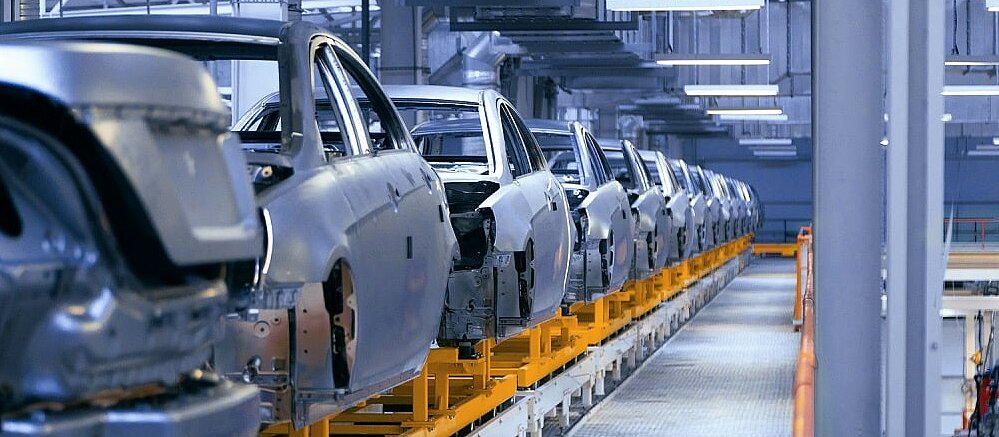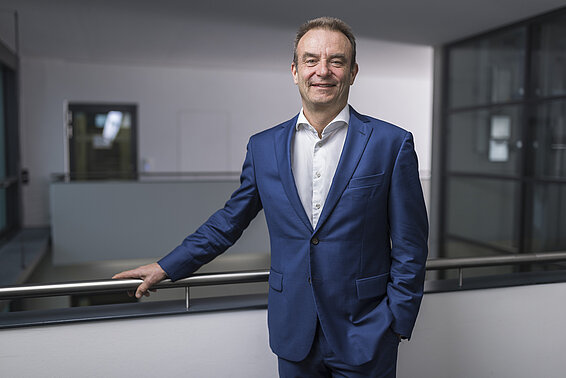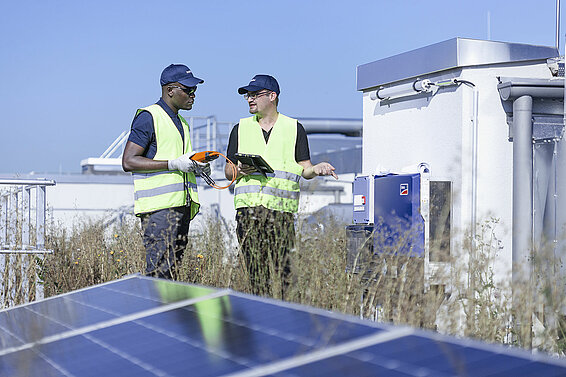The man who is keeping the auto industry’s plants running
In his private life, Markus Glaser-Gallion prefers to ride a bike rather than drive a car. And yet, he manages one of the key industrial service providers in the auto industry.

In his private life, Markus Glaser-Gallion prefers to ride a bike rather than drive a car. And yet, he manages one of the key industrial service providers in the auto industry.
Every day, Markus Glaser-Gallion rides a bike to the office. The 62-year-old CEO of Stuttgart-based industrial services provider Leadec rarely uses a car. Yet in the global automotive industry, very little would run without the support of the Swabian Leadec Group – because the company helps manufacturers with various services such as the maintenance and cleaning of machines and production facilities, in-house logistics, and the administration and management of buildings. “All traditional European premium manufacturers are our clients,” says Glaser-Gallion, citing a few names like Mercedes-Benz and BMW, as well as Daimler Truck, Scania and Traton in the commercial vehicle segment.
Within his family, Glaser-Gallion, who studied business management in Münster, Westphalia, needs to speak up in good time if he needs the car. The current discussion about the planned ban on the sale of new petrol or diesel cars in the European Union from 2035 does not affect the company at this stage. Because it is not dependent on the technology of the cars. “All that matters to us is that cars are being driven.” Every day, the Swabian company’s 23,000-strong workforce looks after 900 factories. Around half of these are automobile and commercial vehicle manufacturing plants and automotive suppliers.
“Our focus is always on the manufacturing processes, not on the product.”
The tasks that Leadec performs for its customers differ widely. For example, it provides technical services for a Mercedes subsidiary in Arnstadt that finishes the crankcases for high-end engines. The highly complex production facilities comprise a wide range of plant and equipment such as machining centers, robots, and electric arc spraying facilities. As a manufacturer-independent service provider, the Stuttgart company has a 50-strong team at the Arnstadt plant that takes care of production equipment maintenance, automation and technical cleaning of all facilities as well as internal logistics, as Glaser-Gallion explains.

Leadec is Voith’s former industrial services division. Around 90 percent of Leadec’s shares are owned by financial investor Triton, and around 10 percent by the management. Glaser-Gallion has been with the company from the outset. For years, he has been a driving force at the company and was previously part of the Management Board of Voith Industrial Services. “To be tasked with establishing an independent service champion is an appealing prospect, and somewhat different from being in charge of a division within a corporation. Basically, an independent service division does not have an easy time of it within a traditional plant engineering company,” he says.
Before Glaser-Gallion joined the Management Board of Voith Industrial Services in 2003, he had held various management roles, including at Raab Karcher and as Chair of the Restructuring Advisory Council at Wellemöbel GmbH. In recent years at Leadec, he has primarily focused on reducing the company’s dependency on the automotive industry. “At the start, the automotive sector accounted for more than 90 percent of our sales. Now it is 55 to 60 percent.”
He estimates the total global market for technical services in the automobile and commercial vehicle segment to be more than €20 billion. This industry has been one of the pioneers of outsourcing. “I assume that outsourcing will increase in the long term when it comes to facility management and maintenance,” he says. “The manufacturers will increasingly focus on production due to the costs.”
The company’s largest market is Germany, followed by the USA and the UK. In the meanwhile, it earns more than €100 million in sales with services relating to electric mobility. According to the Leadec chief, increasing environmental awareness and the plans to reduce the emission of greenhouse gases offer further opportunities for growth. In the field of green services, sales are meanwhile well above €100 million. In this context, for example, the company is installing PV systems or establishing and operating the charging infrastructure in factories.

Glaser-Gallion has also driven the process of internationalization. In the meantime, the company operates in sixteen countries, Leadec follows its customers abroad, just as automotive suppliers have done. For example, Leadec moved to France along with Scania, where one of its key tasks is providing logistics. Empty packaging is collected from the Scania plant, sorted and transported to the packaging handling center, where hundreds of tons of packaging – from wood to plastics and foam materials – are broken up, sorted and prepared for re-use. The material is then returned to Scania’s sub-suppliers. This closed-loop logistics process reduces waste and saves resources, says the CEO, who obviously expects the main shareholder to divest from the company soon. “With Triton, we are in the late stages of our relationship,” says the 62-year-old, pausing for a moment and changing the subject. In the market there is talk of UBS exploring various options.
However, Leadec doesn’t just work for automobile and commercial vehicle manufacturers, but also in the food industry and the aircraft construction sector, among others. “In the case of aircraft manufacturers, the series are smaller,” says Glaser-Gallion. And with online retailers, the company generally maintains the conveying technology and also handles the programming of the conveying systems. In distribution centers, there is generally less work for the industrial services provider to do than in a traditional factory that produces something.
Glaser-Gallion sees opportunities for the company to also profit from the artificial intelligence business. The company could also provide corresponding services for data centers in the future, says the CEO, who owns a 1973 Volkswagen Beetle. He loves to drive it – just not to his office in the Stuttgart industrial zone, as he prefers to use his trekking bike for that.
Article by Oliver Schmale, puclished in the F.A.Z. on November 4, 2025, No. 256, Economy page 19. © All rights reserved. Frankfurter Allgemeine Zeitung GmbH, Frankfurt. Provided by Frankfurter Allgemeine Archiv